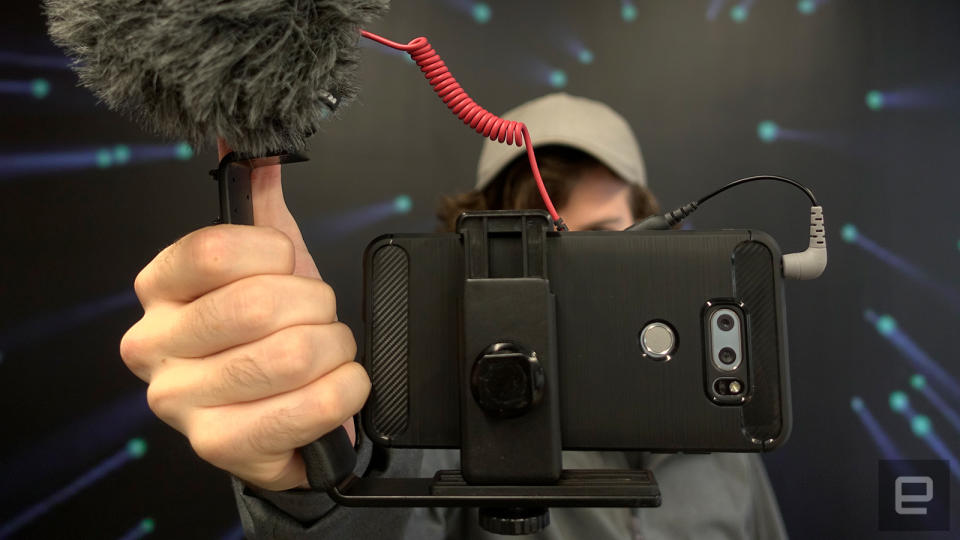The LG V30 is the perfect smartphone for vlogging
Need a YouTube camera but also a new smartphone? The V30 gives you both.
When LG took the wraps off of the LG V30 at IFA last week, it spent nearly 20 minutes of its 50-minute presentation talking about the phone's dual-camera system. Juno Cho, president of mobile communications, rattled off statistics like "almost 80 percent of smartphone users use their smartphone at least once a week to shoot videos." He also said that "we are literally on the verge of transitioning from storytelling to story-showing," which is almost as crazy as Samsung's new catchphrase: "Your New Normal." I digress.
Cho is on to something: YouTube, Snapchat and Instagram are proof that amatuer video is massively popular. Having spotted this trend, LG is positioning the V30 as the ideal tool for anyone trying to break into making video. I decided to put LG's claim to the test and spent some time using the V30 to snap stories for Instagram and Snapchat. Plus, I took plenty of regular videos with the (amazing) built-in camera app.
Unfortunately, the Android versions of Instagram and Snapchat are so bad that I couldn't see much of a difference between the blotchy stories that were shot on my Xperia X Compact (bad camera) and the blotchy stories shot on the V30 (good camera), so that was out. Instead, I decided to narrow my focus to the following three questions: Can you use the V30 to make YouTube videos? Is the V30 a reasonable substitute for a dedicated camera? And is the V30 the best smartphone for making video?
Can you use the V30 to make YouTube videos?
Can you use the V30 to vlog? Can you use the V30 to make YouTube videos even if you're not vlogging? Yes. This seems like a simple question, and it is: You can use almost any camera to make videos for YouTube, but unfortunately "camera" and "Android phone" are not always compatible. I got the bright idea to vlog with the HTC 10 last year because of that front-facing camera with image stabilization, but HTC's default app (at the time) allowed videos to slip below 24 frames per second (fps) in low light, and that just looks terrible. It's fine if a video is dark; it's not fine if it looks like a simulated drug trip.

Is the V30 a reasonable substitute for a dedicated camera?
Luckily, my experience with the HTC 10 was not repeated with the V30. In fact, the V30 is the closest thing I've seen to a smartphone behaving like a real camera to date. Not only does LG give you control over the really important stuff like white balance and ISO, it also gives you control of shutter speed in video (!) and three options for bitrate (!!!). If you're someone who knows cameras and has ever tried to use one of the faux manual video apps on many smartphones, this is like being handed a cool glass of water in hell.
And with a couple of exceptions, the V30's camera app does exactly what it says it's doing, and this is what I consider necessary for a smartphone to replace a dedicated camera. Not sensor or aperture size or anything like that. The camera has to do what I tell it to do, and it has to work all of the time. Then it can replace my real camera.

Despite what LG says on stage, the V30 can't match cameras with DSLR-size sensors, if we're being realistic. A tiny sensor will never produce the bokeh or sensitivity of a sensor of nearly three times the size. But LG gave us something new with the V30: LG-Cine Log. B&H has a lengthy explanation of Log (short for logarithmic) recording, but in a nutshell, this mode gives you flat, unsharpened video that's much better for editing in programs like Premiere and Final Cut. Smartphones may not have the resolving power of larger cameras, but gaining full control over the recording makes the concession far more palatable.
I won't dwell on Log recording because it is somewhat technical, but one thing is worth noting—and it's not even clear that LG has this in mind — but for the first time, you'll be able to download and share color profiles with other people in the form of lookup tables, or LUTs. Plenty of communities exist for trading and selling LUTs for Sony and Panasonic cameras, and maybe there's a better colorist out there than the engineers at LG. I look forward to spending $15 on their V30 LUT package on Gumroad.
Smartphones may not have the resolving power of larger cameras, but gaining full control over the recording makes the concession far more palatable.
But, of course, nothing's perfect, and neither is the V30. I should disclaim that we're using preproduction V30s, and the camera firmware and software isn't final. That being said, I did find a couple strange behaviors with the V30 camera. First, when you plug in an external microphone, the app doesn't automatically record with it. Instead, you have to tap on the microphone icon and set it to record from the headset mic. This is unlike any camera or smartphone I've ever used, so this behavior is a bit of a head-scratcher. Second, something is wrong with 1080p video from the wide-angle camera. Again, this is a preproduction model, but the 1080p video from the wide-angle camera looks like someone set the sharpening and noise reduction to 100 and called it a day.
Is the V30 the best smartphone for making video?
The iPhone 7 Plus and the recently announced Galaxy Note 8 also have dual-camera systems, and both take very good video, but their telephoto lenses aren't a perfect match for what people want to create on YouTube. The tight shots that the telephoto lenses provide are great for interviews and documentary-style video, but those aren't the prevailing formats on YouTube right now. The V30's combination of wide-angle and normal lenses open up more popular YouTube formats like vlogging, extreme-sports videos, skate videos and several more. And while the upcoming iPhone announcement could change a lot, the iPhone 7 series lacks a headphone jack, making it an ordeal to charge and use an external microphone at the same time.
Otherwise, it comes down to taste. Video taken on the iPhone, in my opinion, has best-in-class coloring. Samsung's coloring is fine but looks weird and is hard to post-process because it's already been pushed pretty far. Not only does the V30 offer Log video that allows you to choose your coloring later, I also think the colors coming out of regular video are very nice.
So can the V30 cut it as your primary video-making device? The answer is: absolutely yes. Thanks to its versatile dual-camera system, the V30 is capable of getting lots of different shots. The camera app itself and the manual video mode within it make the V30 worth considering by itself, and nice perks like the headphone jack and waterproofing set it above devices like the iPhone and the OnePlus 5. Samsung's "Do What You Can't" campaign is clearly in love with the idea of empowering content creators, but LG has actually come to the table with the tools content creators need.












